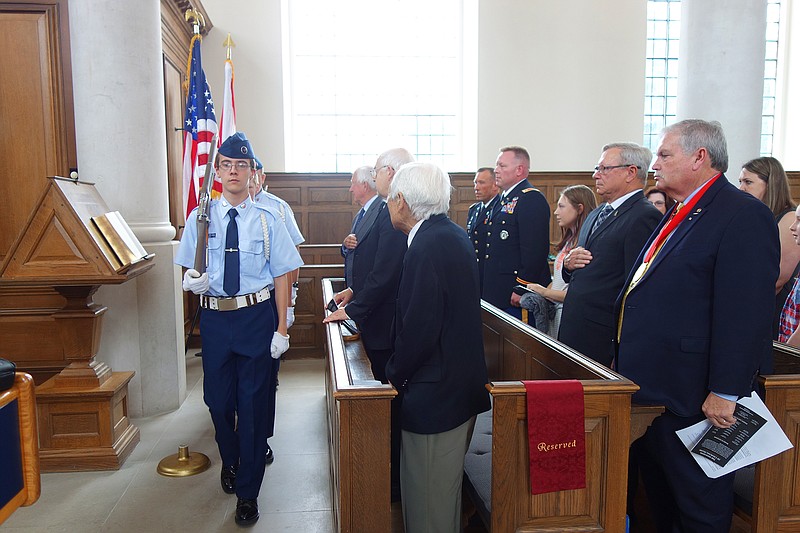Speakers and veterans at Thursday's D-Day ceremony had a clear message.
"War is a bad thing," James Feltz Sr. said. "There's no glory in it whatsoever."
Feltz was among several World War II veterans recognized at the National Churchill Museum in Fulton during a ceremony memorializing D-Day's 75th anniversary. Attendees heard speeches delivered by then-Gen. Dwight Eisenhower and Winston Churchill on June 6, 1944, and mourned the troops who died freeing France from its invaders.
Museum director Timothy Riley thanked the veterans in attendance.
"History is why we're all here," he said. "There are those of you here who lived it and those of you here who made it. For that, we are grateful."
After the end of WWII, he told the crowd, then-Prime Minister Churchill lost his bid for reelection. In 1946, he was asked to deliver a speech at Westminster College - the now-famous Sinews of Peace speech. During his speech, Churchill recalled the warnings he'd given about the rise of fascism before the war broke out.
"He said, 'If people had listened to me, we could've won the war without a single shot,'" Riley recounted.
Churchill urged people to learn from history in the face of a new, rising threat - that of the Soviet Union. Today's threats might be different, but the opportunity to listen to the lessons of the past is still here.
"It's important, especially for the young children (in attendance today) that we remember what happened and why, so we never have to repeat it," urged Gen. Frank Grass, who read a proclamation honoring veteran Capt. Mort Harris.
Henmi
Richard Toshio Henmi witnessed America's xenophobia firsthand during the war. Henmi grew up in Fresno, California. At age 17, in 1942, he learned he and his family would be forced into an internment camp. He noted, though the United States was also at war with Italy and Germany, only those of Japanese descent were detained en masse.
"We had to close our business," he said. "We lost our home, our cars, our pets. War creates a hysteria. Things happen that maybe should not happen."
Three months later, Henmi found a way out: college. He was allowed to apply to Washington University in St. Louis, a city he knew next to nothing about.
In 1943, Henmi was called to the Jefferson Barracks for Army service but ended up in the reserves.
"They didn't know what to do with me," he said. "They thought with my background I could be a spy. I went back to school."
He was drafted once more in 1945. This time, he headed to officer candidate school in Fort Benning, Georgia, and went on to become a highly decorated officer. He and 50 GIs escorted 1,400 German prisoners of war back to Germany following the war's end. He also served as a member of Gen. Eisenhower's division in Munich, guarding trains and railroad yards.
When asked how it felt to don the uniform for a country that had imprisoned his family, he said, "What happened, happened. We felt we had to do our part. The experience was interesting. I learned a lot in the Army and I have no regrets."
After the war, Henmi became a notable designer in the St. Louis area, known for creating the so-called "flying saucer" building in Council Plaza in 1967. His family's experiences in the internment camp inspired him to design good living spaces for his clients.
"I did what I thought would make a better life for people," Henmi said.
At 95, Henmi has had many years to think about peace in this world. He said he doubts it will ever totally happen.
"I don't think we're ever going to have peace, per se," he added. "People have too many opinions. People are more concerned about their countries. We have areas that are constantly in an uproar, in the Middle East in particular - but we could improve things. People should learn to live together better."
Feltz
Feltz grew up in St. Louis County and served in the U.S. Navy aboard the USS Plunkett. His ship carried photographic equipment to Normandy on D-Day.
Information about the operation was scarce among the rank and file.
"We knew it was big, but we didn't know it was that big until we assembled the ships in the Atlantic," he said.
Even then, the historical scale of the event, now considered a turning point in the war, wasn't obvious until much later. Feltz didn't go ashore; he was tasked with bombarding the beaches.
"I didn't see nothing," he said. "I was down in the hole. We found out later (how important the operation was)."
Feltz was also at the Battle of Anzio when it began in January 1944. His ship was struck by a 550-pound bomb, which lit the aft magazine's ammunition on fire.
"One of my good buddies got killed, John Gallagher, on Jan. 23," he recalled.
Feltz aided in the shore bombardment at Cherbourg, France, and later accompanied the first wave of occupation troops to Japan. At one point, Churchill, Gen. George Patton and Secretary of the Navy James Forrestal came aboard to talk strategy.
"They went straight into an office and that was the last we saw of them," Feltz said.
Only recently has Feltz begun to feel comfortable talking about his experiences during the war.
"When I came out of the service, I didn't talk about it for 40 years afterward, until our first ship reunion," he said. "The more you talk about it, the more free you get."
He urged today's youngsters to "live life as fully as you can."
Claude Brauer Friend, of the U.S. Army, and Morton E. Harris, of the Air Force, were also recognized during Thursday's event but were unable to attend.

